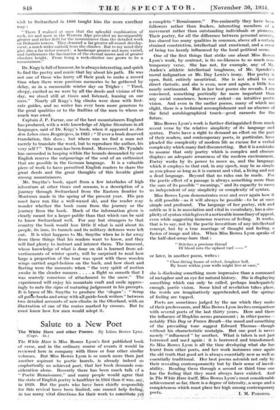Salute to a New Poet
The White Hare and other Poems. By Lilian 13owes Lyon. (Cape. Ss.)
The White Rare is Miss Bowes Lyon's first published- book of verse, and in the ordinary course of events it would he reviewed here in company with three or four other similar volumes. But Miss Bowes Lyon is so much more than just another aspirant to poetic laurels, is already indeed so emphatically an achieved poet, that hei book demands con- sideration alone. Recently there has been much talk cf
Poetic Renaissance," and many people would agree that the state of English poetry is healthier in 1934 than it was, saY, in 1929. But the poets who have been chiefly responsible for this revival have been liinited, one cannot help feeling, in too many vital directions for their work to constitute yet a-complete •" Renaissance." Pre-eminently they have been followers rather than leaders, interesting members of a movement rather than outstanding individuals or pioneers. Their poetry, for all the difference between personal accents, has shared too many qualities in common, above all a certain strained constriction, intellectual and emotional, and a sense of being too keenly influenced by the local political scene.
One of the first things that strike one about Miss Bowes Lyon's work, by contrast, is its un-likeness to so much con- temporary verse. She has not, for example, any of Mr. Auden's athletic intellectual toughness, of Mr. Spender's moral indignation or Mr. Day Lewis's irony. Her poetry is open, fluid, entirely unsatirical. She is not afraid to use direct rhetoric, and she is even, now and again, a little too nearly sentimental. But in her best ioems she reveals, I am convinced, something poetically far more important than any social conscience, however ardent—an intuitive poetic vision. And even in the earlier poems, many of which are slight, there is a technical accomplishment and an absence of the fatal autobiographical touch—good earnests for the future.
Miss Bowes Lyon's work is further distinguished from much recent verse by the relative simplicity of its language and 'syntax. Poets have a right to demand an effort on the part of their readers, and contemporary poets, in particular, have pleaded the complexity of modern life as excuse for a verbal complexity which many find disconcerting. But it is a mistake to assume that only poetry which is complex and obscure displays an adequate awareness of the modern environment. Poetry works by its power to move us, and the language which it employs to that end, in any epoch, may be as simple as you please so long as it is current and vital, a living and not a dead language. Beyond that no rules can be made. For the poetic effect of a passage is always something more than the sum of its possible " meanings," and its capacity to move us independent of any simplicity or complexity of syntax.
Miss Bowes Lyon demonstrates over and over again how it is still possible—as it will always be possible—to be at once simple and profound. The language of her poetry, rich and subtle as it is in association and vital in vocabulary, has a sim- plicity of syntax which gives it a noticeable immediacy of appeal, even while suggesting immense reserves of feeling. It works, that is to say, not by the poetic investiture of any intellectual concept, but by a true marriage of thought and feeling, a fusion of image and idea. When Miss Bowes Lyon speaks of the half-shot-away-hare. that : " Stitches a precious thread Of blood into the upland turf — " or later, in another poem, writes : " Close-fitting house of velvet, foxglove bell, My heart within your walls might live at ease," she is disclosing something more impressive than a command of metaphor and an eye for natural history. She is displaying something which can only be called, perhaps inadequately enough, poetic vision. Some kind of revelation takes place, the words are imaginatively apprehended, and the springs of feeling are tapped.
Poets are sometimes judged by the use which they make of their predecessors, and Miss Bowes Lyon invites comparison with several poets of the last thirty years. Here and there the influence of Hopkins seems paramount ; in other poems— notably This Day or Frozen Breath—the mood and something of the prevailing tone suggest Edward Thomas—though without his characteristic nostalgia. But one poet is never merely " influenced " by another. What is taken is not just borrowed and used again : it is borrowed and transformed. So Miss Bowes Lyon is all the time developing what she has learnt froth other poets, and her work instances once again the old truth that good art is always essentially new as well as essentially traditional. Her best poems astonish not only by their revealing contemporaneity but by their sense of inevit- ability. Reading them through a second or third time one has the feeling that they must always have existed. And in The White Hare itself, Miss Bowes Lyon's most considerable achievement so far, there is a degree of intensity, a scope and a completeness which must place her high among contemporary










































 Previous page
Previous page